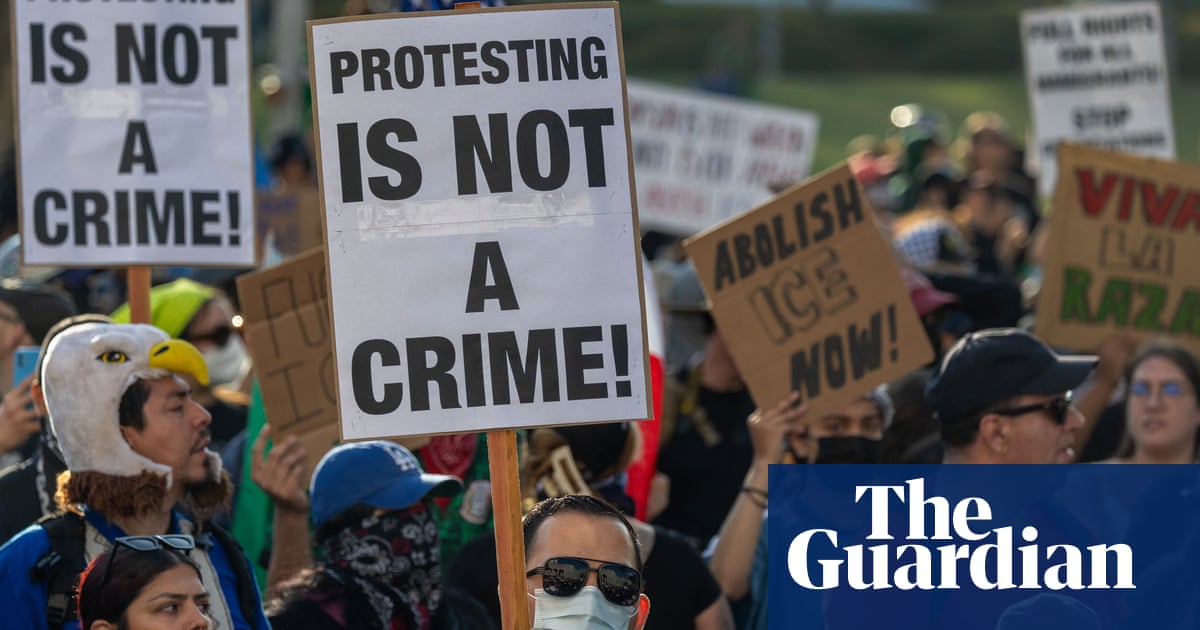As thousands of military personnel descended onLos Angelesunder the orders of Donald Trump and their city was thrust into the center of a political crisis, Angelenos have largely voiced their support for the immigrant community and resistance to the administration targeting them.
“When you are rounding up people with no criminal record while they are at their jobs, it is very clear that the cruelty is indeed the point,” said Alex Berg, 42.“As Americans, we have a constitutionally protected right to protest. As Angelenos, we have a moral obligation to protest Ice raids on members of our community,” he added.
Predominantly peaceful protests, which erupted after federal agents swept into workplaces, immigration hearings and elementary schools last week, were met withan unprecedented and heavy-handed responsefrom the president, in a move the state’s governor, Gavin Newsom, has called “unlawful”.
Hundreds of demonstrators have been arrested or detained in the past week. Officers and troops in tactical gear have relied on chemical irritants, fired rounds of “less-lethal” projectiles, and deployed flash-bang grenades in attempts to squash the unrest. Scores of armored vehicles have been crowded into a small part of the vast city’s downtown in a striking show of force.
Berg believes the escalation was by design, “to chill vocal opposition to the administration”, he said. “They cannot remove our constitutionally protected right to protest through the law, but they can certainly make us think twice about how badly we’re willing to deal with the consequences of protesting.”
While the marches mostly remained nonviolent, dramatic images of burning cars and graffitied buildings have been splayed across the Internet and on social media sites, and Trump has used them to validate his orders. In a speech on Tuesday, the president promised he would “liberate Los Angeles”, and, calling the protesters “animals”, he made a baseless claim that the demonstrations were part of a “foreign invasion”.
Many residents, however, have challenged the president’s descriptions of their city’s demonstrations.
“The protesters have my full support,” said William Rosencrans, a 57-year-old stonemason, who called the moves by the administration cruel and chaotic. “Trump and his allies are using tactics shared by every other authoritarian regime and they must be resisted at all costs and, ultimately, by any means necessary if the country is to be saved.”
Several people echoed these calls. Some described scenes they said felt reminiscent of dystopian movies; large armored vehicles on city streets driven by masked men and women, protesters detained and immigrants taken from their jobs and homes.
“It feels like roving federal kidnap gangs disappearing people off of the streets and the people disappearing are our friends, our neighbors, the people who care for our kids and our homes, and the people that greet us at the shops where we buy the things that make living possible,” said Lon Grabowski, 65, a systems architect who lives in the Hancock Park area of LA. “The effect the raids have on the city and the people in it is purely negative.”
Celeste Perry felt Trump’s mass deportation agenda is part of a ploy. “Last year Republicans blocked meaningful immigration reform per Trump’s instructions to Speaker Mike Johnson. Trump desperately needed to keep immigration his central issue for his campaign,” she said. “The raids are performance to sell his base on the lie that all their troubles should be blamed on immigrants.”
But for many Angelenos life goes on as normal, with people carrying out their lives far from the smoke-filled scenes and skirmishes that are confined to just a few blocks.
“When I walk around downtown Los Angeles – where I live – it’s a quiet, sunny day with light traffic, people walking dogs, meeting friends for lunch, or getting coffee,” Tom Mott, 58, said. “All the rhetoric about the city being ‘on fire’ or Mayor Bass and Governor Newsom being on the side of ‘criminals’ is puffed up nonsense.”
But even in a county where votes were overwhelmingly cast against Trump (he got just over 30% in Los Angeles in 2024) there are some residents who support his actions.
David Oddone, 46, said he thought sending in reinforcements for local police “was smart and necessary”.
“I am glad it was ordered so quickly to secure the city,” he said. Oddone blamed California’s leaders for the “negative impact on people that created families here and are now forced to leave”, but added that deportations are a “necessary step to protect citizens and resources that are already scarce in Los Angeles and California”.
With or without local support, Trump has been clear that he intends to keep his troops in the state, even as California leaders mount an opposition. The state filed a lawsuit on Monday challenging the president’s move to take over the state national guard.
Newsom, California’s governor, has been among those calling for continued resistance to the administration.
“If some of us can be snatched off the streets without a warrant based only on suspicion or skin color, then none of us are safe,” he said in a speech this week. “Authoritarian regimes begin by targeting people who are least able to defend themselves. But they do not stop there.”
Mott called the raids unnecessary and pointed to agreements between Republicans and Democrats that there was a need for “sensible immigration reform”.
“Instead, we have theatrics like this,” he said. “Two thousand national guardsmen to do what, exactly? Guarding the building where they’re detaining a guy Ice nabbed who was selling cantaloupe on the corner?”
